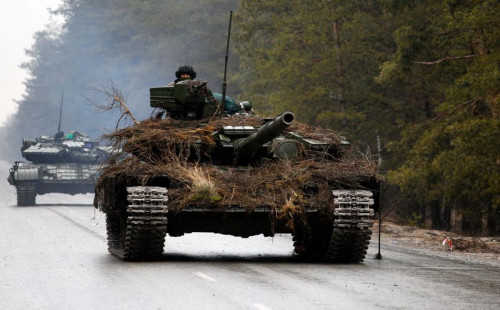Putin Races Against Clock as Fast Military Advance ‘Frustrated’

Russia’s plans for Ukraine face rapidly rising costs due to
delays caused by tougher-than-expected resistance from forces on the ground,
even as its military retains overwhelming advantages.
A person familiar with Russian planning said the military
would have hoped for faster progress. The Kremlin has declined to comment on
details of the military operation, and its Defense Ministry says the campaign
has been successful.
A senior U.S. defense official said the U.S. had indications
that in the last 24 hours Moscow had become frustrated by slow progress, caused
by an unexpectedly strong Ukrainian defense and failure to achieve complete air
dominance. Still, with Russian forces closing on the capital Kyiv amid fierce
street battles on Saturday, the official added Russia so far had committed only
about 50% of its available firepower to the war.
Pushing back against a narrative that the invasion has
stumbled and is targeting population centers, a Russian official also familiar
with the campaign’s planning said it was on track and designed specifically to
avoid urban warfare in cities.
The time frame for the operation’s military goals was
between one and two weeks, rather than a few days, after which Ukraine’s
military should be crushed and its government replaced with one friendly to
Moscow, said the official, who asked not to be identified discussing sensitive
matters. The official added that capturing cities, with the heavy loss of
civilian life that would likely entail, was not on the agenda.
That account of Russian goals largely fits with the analysis
of military specialists in the West and President Vladimir Putin’s stated aim
of “demilitarizing” rather than occupying Ukraine, although it does not appear
to match everything that has happened on the ground.
“Russia still has the initiative, but it is not really
achieving the goals it wanted at this point because the Ukrainians are
resisting,” said Pavel Felgenhauer, a Moscow-based military analyst for the
Jamestown Foundation, a U.S. think tank, adding that Moscow’s leaders may have
been misled by their own belief in the strength of pro-Russia sentiment in
Ukraine.
Ukraine’s Morale
A rapid assault of this kind has to follow up quickly on the
initial shock of invasion to make clear that resistance is futile, Felgenhauer
said. With every day that Ukraine’s organized defense continues, morale will
rise and with it the number of people who take up arms as reserves.
“The next week will be decisive,” Felgenhauer said, adding that while a Ukrainian military collapse or putsch remains possible at any moment, cities may just have to be taken, an inevitably bloody task and a threat to Moscow’s political goals once the government was replaced. “The Russian plan has a lot of holes.”
A longer campaign will also provide more time for Ukraine’s
Western allies to funnel new weaponry, such as anti-tank and shoulder-fired
anti-aircraft missiles, to strengthen its defenses. Since the conflict began on
Feb. 24, the U.S. approved an extra $350 million for expedited weapons supplies
to Kyiv, Estonia said it will send more Javelin anti-tank missiles and the
Netherlands agreed to supply 200 Stinger shoulder-fired anti-aircraft missiles.
Germany made an historic about-face on postwar weapons policy and is now also
sending arms.
“Weapons and equipment from our partners are on the way to
Ukraine. The anti-war coalition is working!” President Volodymyr Zelenskiy said
in a Twitter post on Saturday.
By Sunday morning it was clear too that Russia will face
more aggressive economic penalties than expected, putting pressure on its
finances. The U.S. and European Union agreed to sanction Russia’s central bank
and to shut some commercial banks out of the international SWIFT payments
system. So far, Putin faces very little opposition to his campaign at home and
the Kremlin’s tight control of politics and protests limits any threat to his
rule. But if new western sanctions cause deeper economic upheaval, discontent
could add to pressure on the Russian president.
Failed
Assaults
According to a Saturday military assessment by the Institute
for the Study of War, a U.S. non-profit, Russian forces attempted to take
Ukraine’s second largest city Kharkiv, as well as Chernihiv close to the border
with Belarus, but abandoned that effort and are now heading toward Kyiv. In the
south, units that poured out of occupied Crimea have abandoned an eastward
drive toward Odesa, heading instead toward the eastern city of Mariupol to trap
Ukrainian forces dug into the long front lines of the separatist Donbas
territories.
.png)













